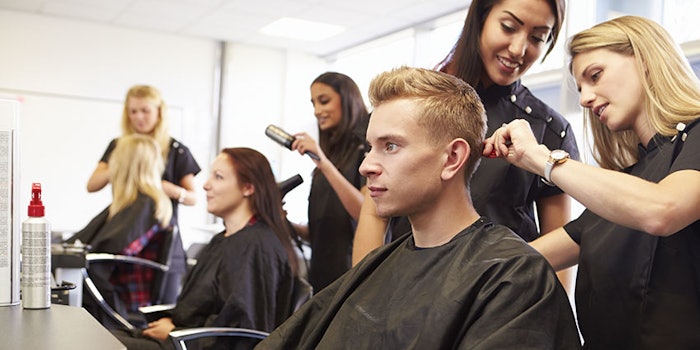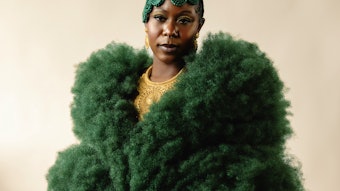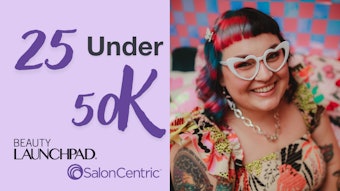
Here’s the hard truth: The next wave of hairstylists’ success is dependent in part upon the generation that came before them—and maybe that’s you. Many of these newbies crave mentorship—a guiding hand that not only teaches them technical prowess, but also steers them through the nuances of stylist-client relationships, retail sales, teamwork, professionalism and more. “I think one of the most important parts of being a successful hairdresser is finding a mentor who can guide you and who you can learn from,” says Larisa Love, owner of her eponymous salon in Studio City, California. On the flip side, “When you hire an assistant, you’ve made it your duty to become a mentor to her,” Love says.
If you’re ready to take on the gravity of molding this next generation of hairdressers, implementing a rewarding salon apprentice program should be your first step. Not only does an apprentice program aid rookies in their seminal rise to working behind the chair, but it also benefits your business in the long term (think: built-in staff retention and a coterie of stylists who live and breathe your salon’s ethos). “Our assistant program literally is what made our salon what it is—the best,” affirms Riawna Capri, co-owner of Nine Zero One salon in West Hollywood, California. If this sounds attractive to you, adopt the following 12 apprenticeship program pointers so that your assistants and salon thrive.
1. Teach All Angles
The assistant system used at Nine Zero One all but guarantees that once an apprentice becomes a stylist, she’s as well-rounded as they come. Apprentices begin as general assistants, tidying up the salon and assisting seasoned stylists when needed. Then, they graduate to personal assistants, where they shadow four different stylists for six months apiece, allowing green students varied perspectives to keep from feeling stagnant. When veteran stylists think the assistant is ready, they recommend she moves on to support co-owners Capri and Nikki Lee, where she’ll spend anywhere from six months to a year training in the business side of hair from the duo. “When they get to us, our assistants learn how to handle a business, build a clientele, do proper scheduling, deal with difficult clients, and, especially with high-profile clients, use discretion,” says Capri. By the program’s end, assistants can hit the salon floor running with a cadre of skills: interpersonal, business, technical and professional.
2. Be Consistent—and Realistic
Sit down and map out how you’ll be educating your apprentices—and then be consistent with the schedule. At Nine Zero One, weekly classes for assistants follow a regular schedule, but admittedly can be stressful due to the frequency. Lee warns not to bite off more than you can chew. “You don’t want to start off with a lot of education and then have to scale back; that can be perceived as a bit of a disappointment to the assistants, who then become discouraged,” she says. “Start slow and then build on it.” Lee recommends beginning with monthly in-salon classes on a regularly scheduled date, like the first of each month. “The assistants will sense the consistency, which is huge for them,” she says. “We’ve found they need structure to feel confident.”
3. Place Stock in the Résumé
Your goal: Fill the spots in your apprentice program with education-thirsty, self-motivated, customer service-savvy assistants who will want to stay on in your salon forever. But how do you do that? Lee likes to base her initial instinct off of the résumé. “I want to see someone who puts in the time: She includes photos of her work along with her listed background—not just some typical résumé with black-and-white type and a name,” she says. Lee believes that degree of effort provides a window into the prospective assistant’s creativity and motivation and that the résumé, as “old school” as it is, works well as a way to weed out who’s serious and who’s less so before the interview process begins.
4. Trust Your Gut
When interviewing applicants, concentrate less on what can be taught (technique, skill and, in some cases, even drive) and more on what can’t (personality). Ask yourself: Who’s the right cultural fit for you salon? This variable changes from salon to salon, but its discovery usually boils down to a gut feeling that can be meted out through the interviewing process. “During the interview I look for eye contact and confidence, and I see if there’s a natural connection between us,” Love says. “Energy and real connection typically don’t lie, so I truly allow my senses to take control.” At Nine Zero One, applicants sit through four interviews starting with the front desk manager, followed by the head manager, then general manager and finally the co-owners. “You want to get different people’s perspectives on the interviewee and, truthfully, people act differently when they’re talking to owners versus, say, a front desk manager. This process allows for us to see if there’s consistency of character when they’re interviewing. Do we all feel the same energy? Does this energy fit our team?” Capri asks, adding, “We’ve learned the hard way by not trusting our instincts.”
5. Set a Probation Period
Of course not all apprentices accepted into your program will jive with the team; sometimes your gut instincts can fail you.To sidestep any issues, Lee suggests setting a program-wide probation period of three to six months where both apprentice and owner can amicably end the program if the situation warrants it. “The first year alone is really just learning the person’s personality and seeing if she fits with the team, so don’t feel bad if things don’t work out,” says Lee.
6. Leave Your Demands at the Door
While drive and motivation can’t 100 percent be taught, cultivating a culture where the two are highly rewarded typically reinforces—and deepens—rookies’ desire to work hard. But sometimes assistants who lack work ethic might not be ready to put in the time—no matter the rewards. “Don’t demand,” Love warns. “If your assistant doesn’t want to do a model, don’t make her. If she doesn’t want to learn or stay after hours, then this is not the career for her.” Take a step back, assess the situation, and, if necessary, pull the rip chord on the probation period exit. “You shouldn’t be wasting your time on someone who doesn’t want to learn,” Love insists.
7. Know When to Be Hands On ...
When learning under Love’s assistant program, mentees work on models once a month right from the get-go, re-creating Love’s easiest to most progressive techniques. For Love, making sure assistants interface with live models right out of the gate ensures advancement and builds confidence. “Having my assistants get straight into touching the hair and becoming comfortable with the clients and their skills is very important; it allows them to grow and learn at a faster pace,” she explains.
8. … And When to Be Hands Off
However, Love takes a step back when these assistant-client interactions occur. “I watch from afar, observing everything from the consultation to her confidence behind the chair to technique to formulation and more. Then, I sit down with her to critique and give pointers on what she did great and what she needs to work on,” Love says. This hands-off approach allows assistants to find their footing and make both triumphs and mistakes without interruption and over-the-shoulder judgment.
9. Critique with Care
But you do need to judge assistants’ progress, and honesty remains the best policy. However, how you critique mentees requires a delicate dance between frankness and teachable information underscored with positivity. “You can be honest in your critique without beating them down. Use uplifting language and show them what they’re doing great and what they need to work on,” Love advises. If you’re too harsh with your criticisms, Love warns that your mentees can shut down, stunting their professional growth.
10. Create a Team Environment
Rather than encourage competitiveness among apprentices, a solid program fosters team camaraderie; after all, your goal should be to retain your apprentices as stylists who enjoy being a part of your staff. “We encourage our apprentices to work together toward a common goal. This way, they become friends. They’re constantly together, living and learning, and they develop into an amazing team where they’re rooting for one another,” says Lee. Strip away the fear of losing out on a chair on the salon floor; you want your assistants to know that there is a place for them in your salon if they work hard. “We let assistants know there’s always going to be space for new stylists to get on the floor, such as when a seasoned stylist cuts back her days because she has started working smarter, not harder. This encourages assistants to stop competing against one another for chairs and instead focus on their education and being part of a team,” Lee adds.
11. Take Them With You
If your salon travels to education events or works with celebrity clients, these opportunities present invaluable teaching moments for assistants that grant them a professional edge over the long run. “My assistants travel all over the world with me, which allows them to witness a more fast-paced life of a hairdresser,” says Love. “They’re put in situations where they need to work under pressure and learn how to be quicker and more efficient.”
When Capri and Lee work with celebrities—whether for a red carpet event or to change an actress’s look for a project—they often bring their assistants in training. “They learn about more than hair; it’s an adventure. You never know what’s going to happen, and they learn how to pivot on a dime and navigate problem-solving with no complaints,” says Lee. “For instance, when you show up with hair extensions and find out the colorist chose a different shade last-minute—situations like that teach them to be over-prepared for that next job.”
12. Think Outside the Box
In addition to focusing your program on shadowing seasoned stylists and offering technical classes, integrate an artistic element that tests apprentices’ ability to take what they’ve learned while displaying their personality and creativity. At Nine Zero One, the apprenticeship program commences with the Soiree, where the apprentice not only showcases her work, but also chooses her theme—circus, cowboy or whatever speaks to her creative soul—and then is responsible for sending out event invites to the entire staff. “We have assistants include 10 different elements in their Soiree presentation, like taking a model from blonde to brunette and vice versa, and then they have their models walk a runway,” says Capri. After the presentation, the two owners go over every detail with a fine-tooth comb, and then the assistant either passes or fails. But it’s the journey of putting together the Soiree that Capri feels encourages, yet again, a fellowship with staff as well as reinforces strength of self for the assistant. “Everyone’s so supportive,” Capri says. “It’s not like an assistant program where the owner solely chooses who goes on the floor without a test. When you do that, you’ll find other apprentices questioning whether that person deserves to get on the floor—you don’t want that. With our Soiree test event, the entire team cheers the assistant on—and it grows from there.”
Every salon has unique needs, but when you implement a successful apprentice program, you’re all but ensuring that your needs will be met by the assistants you teach once they become stylists. Nurture them, teach them, constructively critique them and, eventually, hire them. But remember, as Love says, “Mentorship is a lifetime program.” Your assistants may graduate to loyal stylists, but your role as a mentor never ends.











